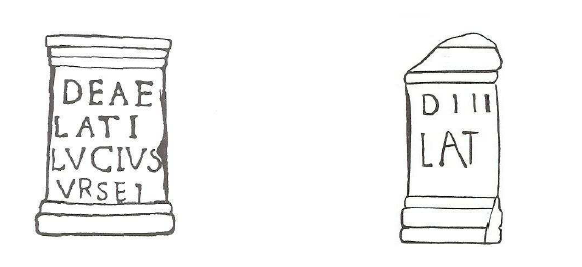4) Britain
It is worth noting that the function of conveying alcoholic drinks is also reflected in the names of two British goddesses: Latis, mentioned in two inscriptions from Cumbria, and Braciaca, honoured in a military dedication from Derbyshire (see map, fig. 19).
a) Latis (‘Intoxicating Drink’)
The first inscription to the goddess Latis is engraved on an altar discovered in 1843 near the ruins of a fort at Fallsteads, which is situated to the south of Burgh-by-Sands, near Hadrian’s Wall: Deae Lati Lucius Vrsei(us), ‘To the goddess Latis, Lucius Urseius (set this up)’ (fig. 12).2353 The dedicator has Latin names and bears the duo nomina of Roman citizens. The second inscription was found in 1873 at Birdoswald, which is also located near Hadrian’s Wall: Di(a)e Lat[i], ‘To the goddess Latis’ (fig. 12).2354 On the back of the altar, a jug and a patera* are engraved.

It can be assumed that Latis, if based on lǎti- with a short ‘a’, is to be related to Old Irish laith, ‘ale, intoxicating drink’ or ‘swamp’ and laithirt, ‘drunkenness’ or ‘addicted to drunkenness’; Welsh llad, ‘ale, intoxicating drink’ or ‘mud’-; Latin latex, ‘liquid’; and Greek látaks, ‘a glass of wine which is almost empty’. These words come from an IE root *lat- which can either mean both ‘wet’, ‘damp’ or ‘swamp’, and ‘drink’ or ‘fluid’, which explains why the Irish, Welsh and Breton words have two different meanings, either referring to water, or to an intoxicating beverage.2355 It follows that, on the one hand, Latis can mean ‘Goddess of the Bog/Pool’, and thus be a deity of watery places, which is quite conceivable since the two inscriptions were discovered in stations and since there is a River Latis in the Plain of the Po.2356 On the other hand, Latis can mean the ‘Intoxicating Drink’ and be a goddess of intoxication, like Medb.2357 It is even more probable, given that a jug, bespeaking her function of pouring drinks, is engraved on the back of the altar found at Birdoswald.